When it comes to the guinea pig diet, there’s a very important balance of vitamins and nutrients that they need in order to stay healthy! One of the easiest ways that you can extend your piggy’s lifespan is by making sure they eat a balanced diet of hay, fresh fruits and vegetables, pellets, and water.
For a comprehensive list of the types of produce that guinea pigs can eat, please reference our Vegetable Master List and our Fruits Master List! Both of these contain the names of the fruits and vegetables, as well as the kinds of vitamins and other nutrients they offer your guinea pig, and how much to feed them, as well as how often.
All of this information can be found at a quick glance, so it’s especially useful if you don’t want to read too much! However, if you are looking for more in depth information on each type of produce, there are blog posts for each and every one of them as well.
We’ve also written blogs with more information on the types of hay that guinea pigs can eat and what kinds of nutritional benefits that each offers to guinea pigs. It’s important to note that even though there are different kinds of hay that guinea pigs are able to safely eat, some are not good for your guinea pigs in the long run and have more downsides than benefits.
Because of all these dietary requirements, you may be wondering things like do guinea pigs need vitamin supplements, and while most guinea pigs will be able to get what they need from their regular diet, sometimes it’s not quite enough depending on what produce you’re feeding them.
What kinds of vitamins and other nutrients do guinea pigs need?
There are a couple main ones that they need in order to stay healthy, and we’ll talk about them in depth and what they offer to your piggy! It’s important to know all the different components that should make up the parts of guinea pig nutrition and how they interact with each other, and how they add up! As you’ll see later, calcium and phosphorus work together, so it’s important that they’re balanced.
Doing thorough research on what is good for your guinea pigs is one of the best steps you can take for you to be the best guinea pig parent that you can be!
Similar to humans, guinea pigs aren’t able to produce their own vitamin C. Because of this, they have to get it from various sources in their diet, whether it be from the fruits and vegetables, or the pellets they eat.
Some guinea pig parents even add vitamin C drops to their piggies’ water, but this isn’t really recommended because it can change the taste of the water, which in turn makes the guinea pigs not want to drink it. Water is super important to the guinea pig diet too, so make sure you’re always refilling and replacing the water in their bottles!
You may be wondering what kinds of benefits vitamin C has for guinea pigs! One of the biggest ones is that it helps prevent your piggy from suffering from scurvy. Scurvy has some pretty detrimental effects on your guinea pig’s overall health and quality of life once they begin to suffer from it.
Some of the things your piggy may experience are excessive and prolonged bleeding over minor injuries, pain and difficulty eating, unhealthy weight loss, difficulty walking, internal bleeding, and many others. In the worst-case-scenario, sudden death will occur. This is why vitamin C is so heavily emphasized when it comes to your guinea pig’s health.
It also has the ability to fortify your guinea pig’s immune system! This is more vital than you may realize. Guinea pigs are extremely susceptible to infections, and it’s important that their immune system and their overall bodies are equipped to fight them off.
It’s also super useful for protecting a guinea pig’s cells against free radicals. Free radicals are molecules that are produced when their bodies break down food, and they play a role in causing things like heart disease, cancer and other diseases.
Vitamin C is also necessary for things like forming blood vessels, cartilage, muscle and collagen in bones, as well as their body’s overall healing process! The purpose of forming new blood vessels is so the body is able to transport oxygen-rich blood efficiently to different areas of the body that need it, whether it's their organs or smaller areas of tissue.
If you’re looking for a great vitamin C supplement for your guinea pig if they’re not getting enough from their normal diet, take a look at our GuineaDad RoseHip Organic Herbal Treat.
It’s the perfect tasty treat for them, while also offering them health benefits! It’s all natural and organic, with no additives or preservatives, meaning you know that it’s super safe and healthy for them.
Calcium and Phosphorus
Calcium is necessary for guinea pigs to build and maintain strong bones, and their heart, muscles, and nerves also need the calcium to function properly. Phosphorus works in tandem with calcium to help with the formation of bones and teeth!
Guinea pigs also need calcium and phosphorus in their diet, but there’s a very delicate balance of both that needs to be considered as well. The ideal ratio is 1.33:1, and you can read more about how to find this in your guinea pig’s diet here.
The amount of calcium and phosphorus guinea pigs will need will depend on their age, sex, and overall health. For example, younger guinea pigs will need high amounts of calcium because they’re still growing and developing. Or, pregnant guinea pigs will need extra calcium for the nursing they will do when their pups are born!
Another example would be older guinea pigs needing more calcium because they need to maintain the strength and condition of their bones in order to stay healthy as they continue to age. There are even cases of satin breed guinea pigs that have high needs for calcium because of their satin gene making them calcium deficient.
However, just as necessary calcium is, it’s also important that guinea pigs are given foods containing large amounts of it in moderation. Too much calcium can lead to issues in the urinary tract, including bladder stones that clog their urethra and block them from being able to pee properly and comfortably, and calcium deposits in their urine.
These bladder stones that are too large have to be removed surgically as soon as possible, so it’s important that you’re staying observant of your guinea pig and changes in any of their behavior that might indicate that something is wrong with them.
Iron
Iron is also something that guinea pigs need for their reproductive health, as well as their overall growth and development. When it comes to the production of new blood cells, iron plays a large role in the creation of hemoglobin and myoglobin, which are both proteins that help with oxygen transport to different parts of the body.
Hemoglobin directs oxygen throughout the body, while myoglobin brings oxygen to the muscles specifically. This is important because oxygen is necessary for proper function of all parts of the body, and especially the muscles that our piggies use to zoom around!
Potassium
This is just as important for guinea pigs as it is for us! It regulates blood flow which is vital in proper oxygen transportation throughout the body. It’s also important for allocating how carbohydrates are utilized in the body, and therefore has an important role in energy use.
Potassium also helps in fighting against arthritis, which is the inflammation or the swelling of joints. As you can imagine, this is especially a concern when it comes to older guinea pigs.
As they get older, their body can get weaker, so it’s important to maintain their overall bone health in order to keep them active even as they age! The more active your guinea pig is, the healthier they are and the longer they’re more likely to live.
The best way to find out what kinds of vitamins and supplements that your guinea pig needs is by taking a look at their waste output, and also by consulting your vet if you have suspicions of your guinea pig needing more or less of anything.
When it comes to most things, it’s important that you get a professional medical opinion before you enact any major changes to your guinea pig’s diet.
What kinds of supplements do guinea pigs need?
It’s important to remember that all guinea pigs are different, and what they will need depends on their overall health, along with other factors, such as their sex and age, as well as what you’re already feeding them in their normal diet.
It’s also important to note that these are treats, and should be treated as such! They’re not meant to replace normal meals, and your guinea pigs should never have more than a few a day.
For Protein: GuineaDad Pea Flakes
A great way to give your guinea pig a treat and provide them a great source of protein, without any of the guilt.
Protein is necessary to fuel your piggy because it is part of the process that creates energy for their body. It also helps their body transport oxygen throughout their body, so as you can imagine it works in tandem with iron.
Protein is also known to help with maintaining healthy weight because it helps your guinea pig feel fuller for longer. However, with that being said, this is not meant to be a meal replacement, and this is still a treat that should be treated as one! There is 23.8 g of protein in 100 g of our pea flakes.
For Digestion, Immunity and Skin Health: GuineaDad Marigold
Marigold has been known to aid with healing external injuries and boosts the immune system.
It’s important that your guinea pig’s body is able to heal external wounds such as scrapes and cuts, because otherwise they can become infected and make your guinea pig sick. Secondary infections almost always come after the initial one.
It’s important that by boosting your guinea pigs’ bodies’ ability to heal injuries on the surface level, but are also giving their body the ability to fight any infection that may come with it. If your guinea pig has any wounds or a compromised immunity, this herb can do its part to help your piggy recover.
For Stress Relief, Digestion, and Eye Healthy: GuineaDad Chamomile
Your piggy can be pushed into distress from a variety of factors because they’re naturally prey animals, but this treat can help put them at ease in a natural and healthy way.
Chamomile can also help with pain management from things like bumblefoot and any other pain and discomfort they may be feeling. It’s also great for helping with digestion.
People often underestimate how important the digestive tract is, especially in guinea pigs! For our piggies, it’s important that everything goes smoothly because guinea pigs will eat their own poop! You might have noticed this happening and might have wondered why.
Guinea pigs aren’t able to fully absorb the nutrients from their food the first time, so they poop out tiny little caecotrophs, which they’ll eat to absorb the rest of the nutrients. Because this is a necessary part of their digestive routine and overall diet, it’s important that the overall process goes smoothly.
For Immunity and Blood Health: GuineaDad RoseHip
Guinea pigs are susceptible to scurvy and this treat can be your solution to eliminating that risk! Vitamin C also helps boost the immune system to help them fight off illness and disease.
As mentioned previously, it’s important that your guinea pigs get enough vitamin C, and this treat is a great supplement to your piggies’ diet if you think that your guinea pigs aren’t getting enough with their regular food.
This treat is also high in iron, which helps promote healthy blood and the synthesizing of hemoglobin and myoglobin, both proteins that help with oxygen transport.

For Digestion, Blood Health, and Eye Health: GuineaDad Dandelion Leaf
This herb is high in fiber, which makes it great for aiding digestion and easing any issues your piggy may have with it. It has more iron than spinach, more potassium than bananas, and more beta-carotene than carrots.
This is a superfood in its own right, helping with maintaining eyesight, functioning nerves and muscles, and healthy blood. As piggy parents, you probably know that guinea pig eyesight isn’t very good compared to other animals, so it’s important to maintain what they’ve already got.
Aiding with digestion doesn’t just mean aiding with creating the poops that your guinea pigs, but it also means reducing any bloating that might occur in your guinea pigs. Too much bloating can be pretty dangerous for your guinea pig, so we want to prevent that as much as possible.
For Digestion, Immunity, and Uterine Health: GuineaDad Raspberry Leaf
This herb helps to support metabolism because of the high fiber content. This is important because you want your guinea pig’s body to be able to sufficiently turn food and nutrients into the proper energy sources that guinea pigs need in order to fuel those zoomies and popcorning that we love so much.
Any digestion issues your piggy may have can be eased with this tasty treat as well. High fiber food can also help with controlling blood sugar levels. This can be especially great if you include fruit in your guinea pig’s diet.
Fruits tend to have high sugar contents, which isn’t good for piggies because they’re not able to process and break down sugars as well as we can. They’re also great for guinea pigs that are pregnant or have recently given birth due to its abundance in health benefits that can help them with uterine recovery afterwards.
Keep your guinea pig healthy!
For guinea pig parents, there are so many things that you can do in order to make sure that you are able to keep your guinea pigs healthy and thriving.
Their happiness and comfort are paramount goals, so in order to do that, it’s important that you’re making sure that they eat a well-balanced and nutritious diet—it is the best way to keep them not only healthy, happy, but it increases their lifespan as well! Make it your goal to give them everything they need.
Read more about guinea pig health in these related blogs!













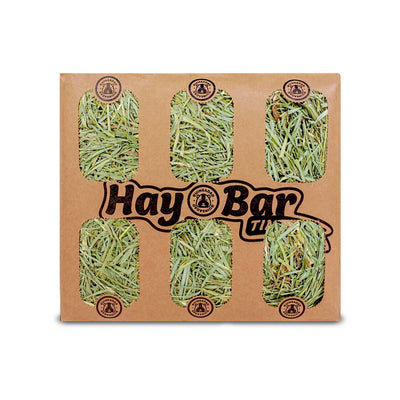
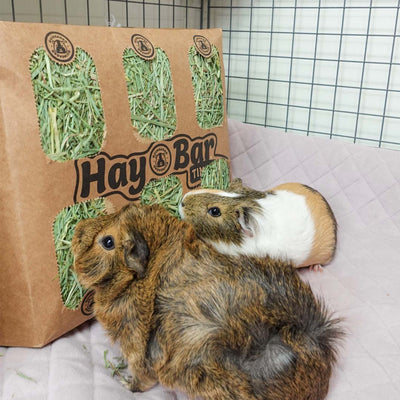
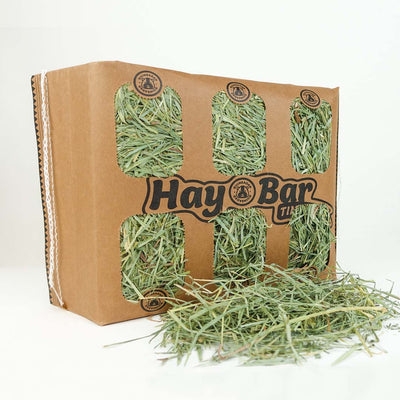
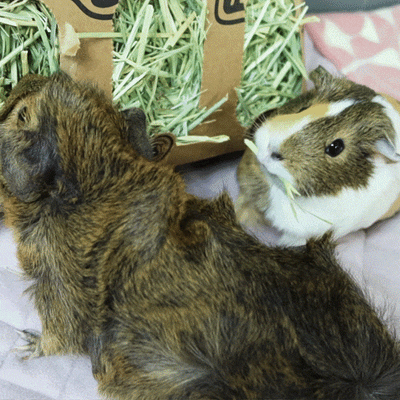
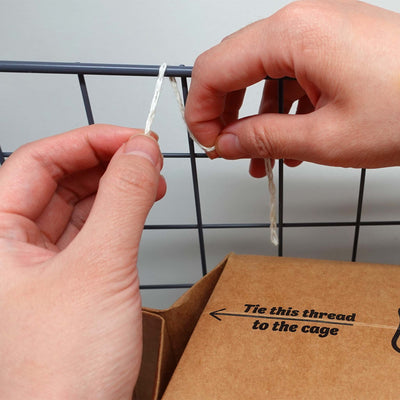
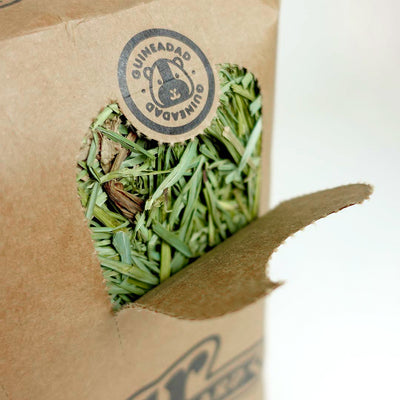
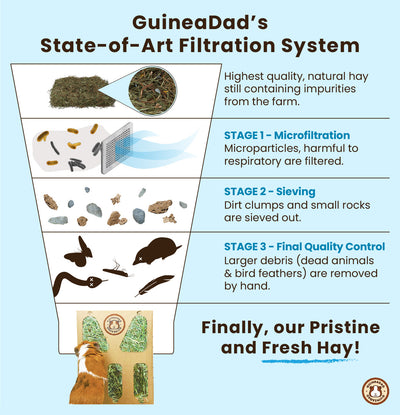
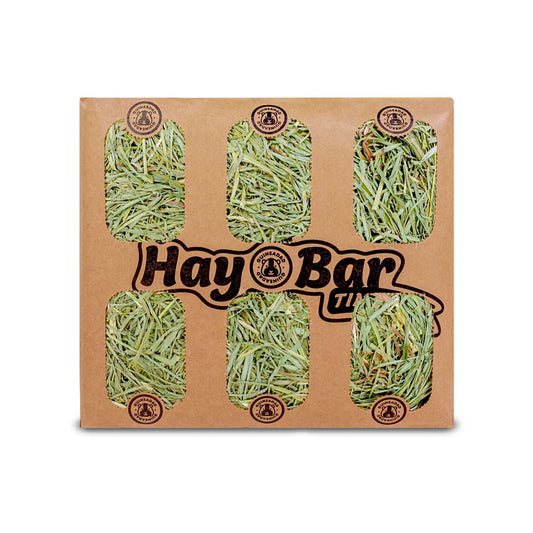
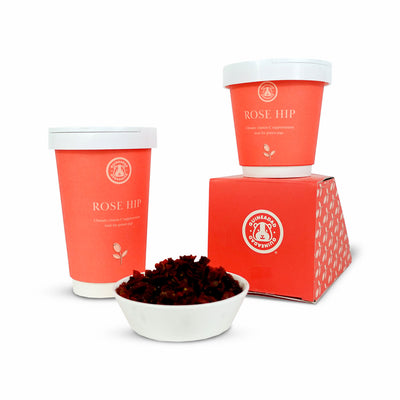
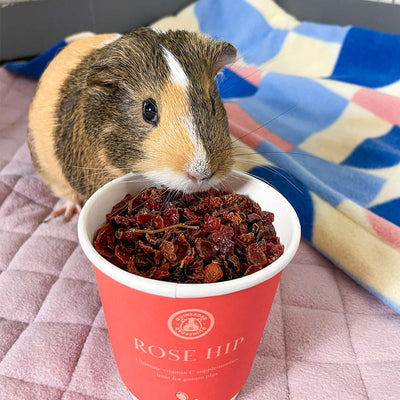
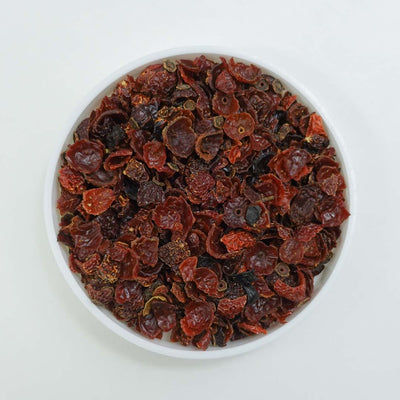
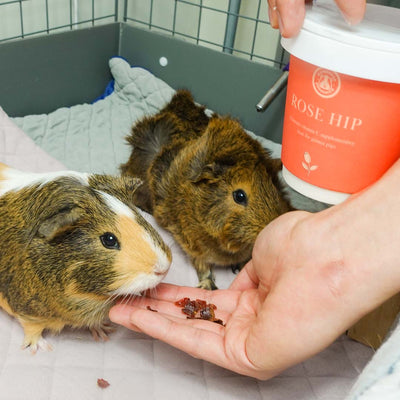
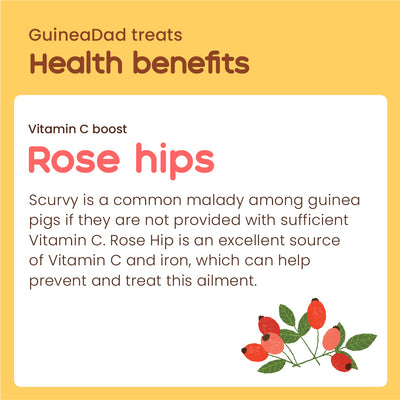
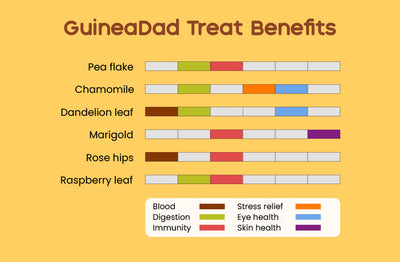
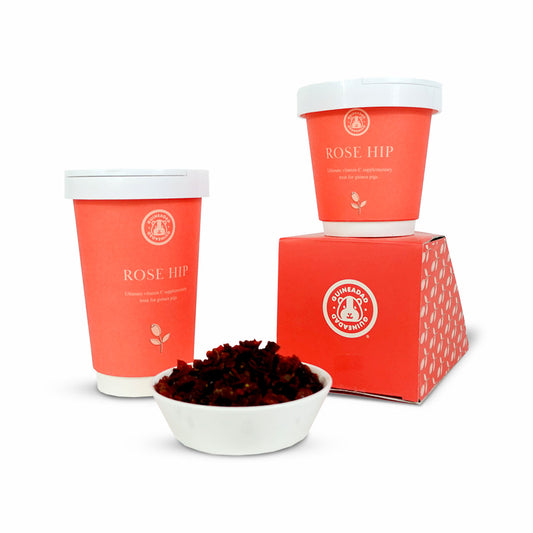
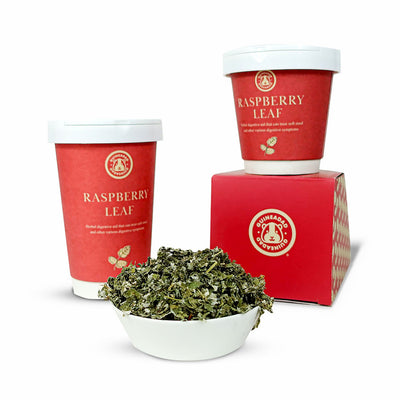
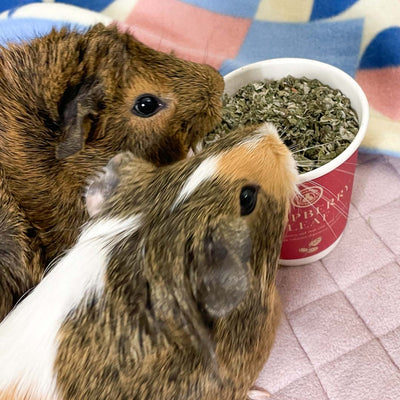
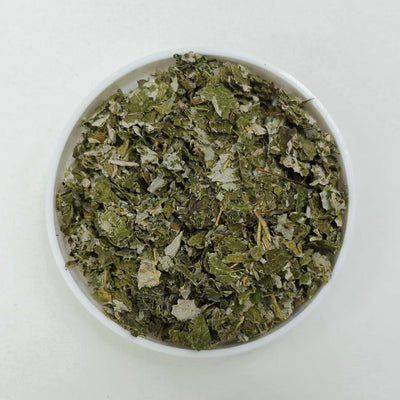
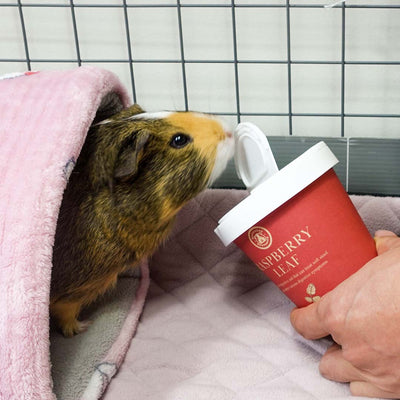
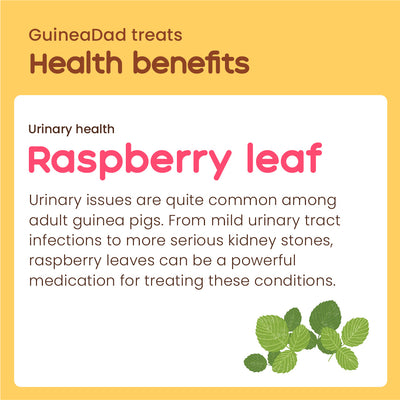
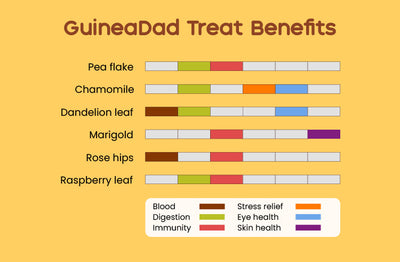
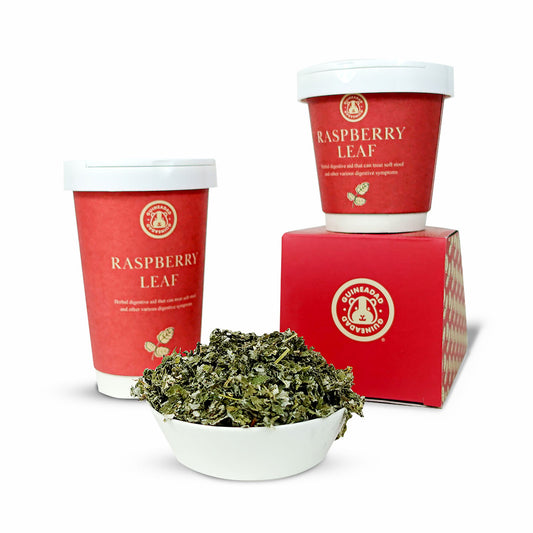


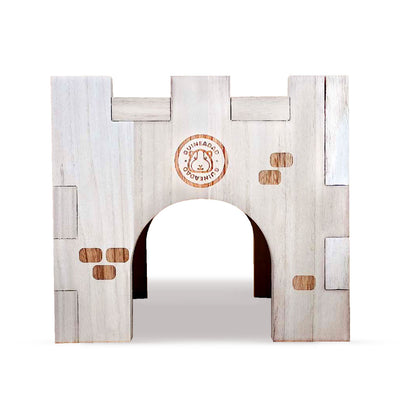










1 comment
How much of each GuineaDad supplement is to be fed daily/weekly?